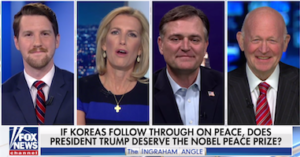Just How Much Does Trump Want a Nobel Prize?
Maybe it was a feint, maybe a sign of a real problem. North Korea’s bleat this week that the combined U.S.-South Korean military exercises, a staple over many years, was now emerging as a reason for North Korean to bail from at least one important follow-up meeting with the South and maybe scuttle the North Korean-U.S. talks should remind us all, from the White House on down, that agreement and real peace prospects will prove a lot more hard work than slogans.
From the White House, there were protestations that the talks will still happen. Trump said that if the North Korean leader agrees to denuclearize, he will get what Trump is calling “protections that would be very strong.”
Meanwhile, the BBC reported North Korea was continuing to unleash critical language toward South Korea. In angry language, North Korea said it will not resume talks with the South until issues between the two countries are resolved. Its chief negotiator dismissed the South Korean authorities as incompetent and senseless.
Rather than running toward one another to maintain peace talks, the parties are retreating to their corners and warning of alternatives.
As a Washington Post editorial had it, the wake-up call for Trump, who already has all but awarded himself the Nobel Peace Prize as he and his aides promise to accept nothing less than the “complete, verifiable, irreversible denuclearization of North Korea,” accomplished on a quick timeline: “North Korea’s rhetorical tantrum was a reminder that the Kim regime will almost certainly agree to no such thing.”
Actually, most of the statements after North Korean Vice Foreign Minister Kim Gye Gwan was quoted as saying that the U.S. had best think twice before assuming that North Korea will accept full denuclearization as a unilateral move showed the fluster of trying to decode North Korean diplomatic tactics.
What Minister Kim and we could probably agree on is that presidential National Security Adviser John Bolton spews a regularly appearing amount of distressing, non-diplomatic advice about foreign policy that always sounds more war-like than needed.
To me, what is unclear in all of this is why the long-planned military cooperation exercises couldn’t have been postponed, not as a concession, but as a logical way to keep the current state of momentum running.
Or even wilder—to ask North Korea if they might want to participate, somehow. But no, it is way too early. We’d have to be talking about actual peace for those actions to come about, instead of what eventually may be accepted as faux-peace.
Upon his return from North Korea last weekend, Secretary of State Mike Pompeo disparaged “the traditional model” of a deal with North Korea “where they do something and we give them a bunch of money . . . Our ask is complete and total denuclearization.”
Said the Post editorial, reasonably: “The U.S. rhetoric implies that the North Korean leader has decided on a stunning reversal of decades of policy and is suddenly prepared to accept full disarmament in exchange for security guarantees and economic investment. Yet nothing Pyongyang has publicly said or done supports that. On the contrary, Kim Jong Un appears to be following almost exactly the same script as his father when he struck a deal on nuclear weapons in 2005—and then, having pocketed the short-term economic gains, proceeded to violate it.”
It was good news that Kim Jong Un released three American hostages and made a public show of dismantling a nuclear test site. Threats to walk out of talks or the abrupt cancellation of meetings also are part of North Korea’s standard playbook, every opinion piece on the talks has concluded.
Rather what surprised me most about the Korea detour was that the White House itself was surprised.
I certainly hope Trump is a better negotiator than that. Otherwise, when the smoke clears from all this talk and the meetings inevitably take place, we will see the North Koreans getting exactly what they want—some kind of recognition as a real country, and some kind of economic support—while the U.S. will find itself in an increasingly isolated position.
China and South Korea want to find a way to make this stuff work; the U.S. is less convinced, I think.
“The question is, can Mr. Trump accept half a loaf, at least in the short term? If not, he is likely to come away with nothing.”
So much for the Nobel Prize.






